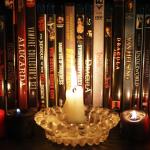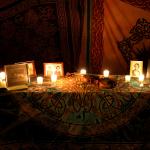I’m going to do something dangerous – I’m going to try to start a conversation about witchcraft.
I don’t want to talk about what witchcraft is. I have my own definition and I’m satisfied with it, but I always do my best to be clear that other people have other definitions and I’m not trying to tell them they’re wrong. Whatever else witchcraft may be, for some people it’s an identity, and critiquing other peoples’ identities is a good way to start a fight. A needless and unhelpful fight.
I want to talk about what witchcraft is for.
Why do you do witchcraft – however you define it? What does it bring you? How does it help you? How does it change you, for better or worse?
Different people will have different answers and that’s OK. I have my own thoughts, but they seem incomplete. Or rather, when I started this I expected to have a much longer list. I want to make sure I’m not missing something that may be important.
What is witchcraft for?
Witchcraft is for dealing with spirits
Witchcraft isn’t for connecting to Gods and Goddesses. I know some people whose relations with their deities are part of their witchcraft, but for me that’s part of my Pagan and polytheist religion. Not just a part, but the most important part. Of course, there’s not a hard line between witchcraft and Pagan religion – I end some of my magical workings by addressing the deities with whom I have a regular relationship and saying “add your magic to mine, I ask.”
On the other hand, witchcraft is for contacting and working with spirits. That’s something people have always done, and sometimes they wrote books about how to do it. I don’t agree with those who say witchcraft can only be done with the aid of spirits, but it is one way to do witchcraft, and one thing that witchcraft is for.
Witchcraft is for seeing the world in a different way
Witchcraft is not for spectacle: not to convince skeptics, not to impress the general public, and not for your own amusement. Some years ago a materialist skeptic was harassing me after I wrote about magic. He kept saying “show me just one little fireball.” First of all, magic doesn’t work that way. But also, if I had managed to throw a fireball at him that would have made the Wicked Witch of the West proud, he would have found some reason to rationalize it away.
But witchcraft is for seeing the world in a way ordinary people can’t, or won’t. It is for proving to yourself – even if no one else – that there’s more to life than the ordinary world. I like to say that the best way to believe in magic is to do magic. Do it right and you’ll get results, and sooner or later it becomes easier to accept that there’s a reality to magic and witchcraft than to keep ignoring what you see with your own eyes.
Witchcraft is for things that aren’t obtainable with ordinary effort
Witchcraft isn’t for doing what you can more easily and reliably do with ordinary effort. I occasionally see people with religious objections to witchcraft say that magic is taking the lazy way out. That they think there’s something wrong with doing things the easy way instead of the hard way is a problem with their religion, but it also shows how little they know about witchcraft. It’s a lot of work writing spells, gathering supplies, finding the most auspicious times to work magic, and then actually doing it. If you can do something with ordinary effort it’s usually easier and almost always more reliable.
On the other hand, witchcraft is for things that are out of the reach of ordinary effort – for removing obstacles, for bringing you what you need. One of the traditional uses of witchcraft is to get justice for people who are oppressed and for whom the doors of the justice system are closed. If you don’t have wealth, power, and connections you still have magic.
It’s also for things where ordinary effort alone may not be enough. I have two long-term hypersigils I’ve been working on for years. I’m putting lots of ordinary effort into the projects, but the magic helps handle the things that are out of my control.
Speaking of things that are out of your control, witchcraft is for protecting you against random bad things and against those who would do you harm, whether from malice or from apathy. It’s defensive magic, and when necessary it’s offensive magic. It’s cleansing, shielding, and warding. It’s mirror spells, freezer spells, and binding spells. And sometimes it’s even stronger spells.
Witchcraft is for learning hidden knowledge
In Excalibur (1981) Merlin leads Morgana through the woods, quizzing her and teaching her on the medical and magical uses of various plants and herbs. Joan Clayton does the same for Vanessa Ives in Penny Dreadful (2014 – 2016). This is fiction, but these scenes are based in actual witch lore, both ancient and modern. And while plant magic is a part of witchcraft, what strikes me as most important here is learning obscure knowledge.
Witchcraft is usually considered “occult” – a word with Latin origins that means “hidden.” Witchcraft is for learning hidden knowledge, especially knowledge that’s hidden because it’s dangerous to those who don’t know how to use it properly.
I am eternally curious, about anything and everything. Is it any wonder I’ve always been interested in witchcraft?
Yes, it’s dangerous. I’ve burned my fingers a time or three. Sometimes I didn’t know as much about something as I thought I did. More often, I didn’t think through what I was doing and what unintended consequences might be generated.
That too was something important to learn.
Witchcraft is for building confidence
When we learn, we build skills. When we build skills, we build confidence. Witchcraft – actually practicing witchcraft, not just adopting the aesthetic of witchcraft – gives you the confidence that you can deal with whatever comes your way, one way or another.
You know you can generate results, because you’ve done it. You know you can protect you and yours, because you’ve done it. You know that no matter how long the odds, you are never powerless.
If you do witchcraft for very long, you learn that magic often works in ways we wouldn’t expect. That reminds us to look for success in unexpected places, which in turn makes us open to trying new and different approaches to magic… and new and different approaches to our mundane work.
All this makes us more confident, more resilient, and especially more adaptable – and that’s a trait that’s critically important as we move forward through Tower Time and into the Rising of The Star.
What else is witchcraft for?
Should divination be on this list? I didn’t include it here, but I know some would. I don’t consider connecting to Nature to be witchcraft (even though it’s very important to my Pagan religion) but I know others do. In any case, I’m not trying to create taxonomy of witchcraft.
What am I overlooking? What have I not encountered in my own practice that’s important in yours? What do you use witchcraft to accomplish – in any sense of the term – that I haven’t mentioned?
Please let me know in the comments, or on whatever social media you discovered this post.


















